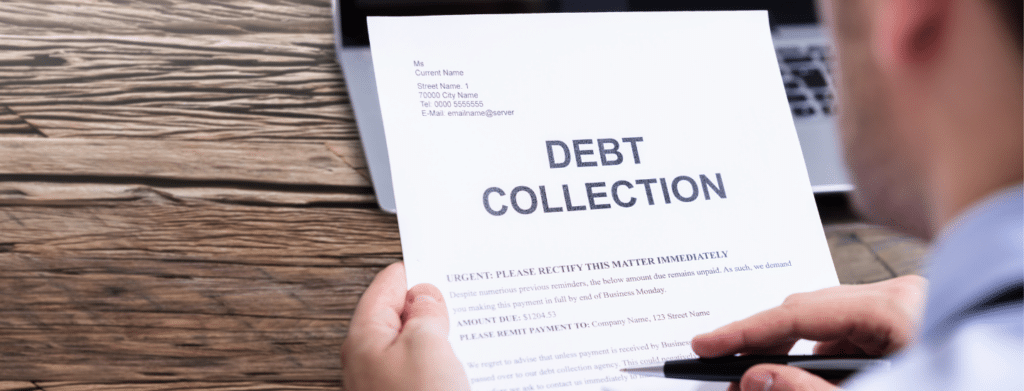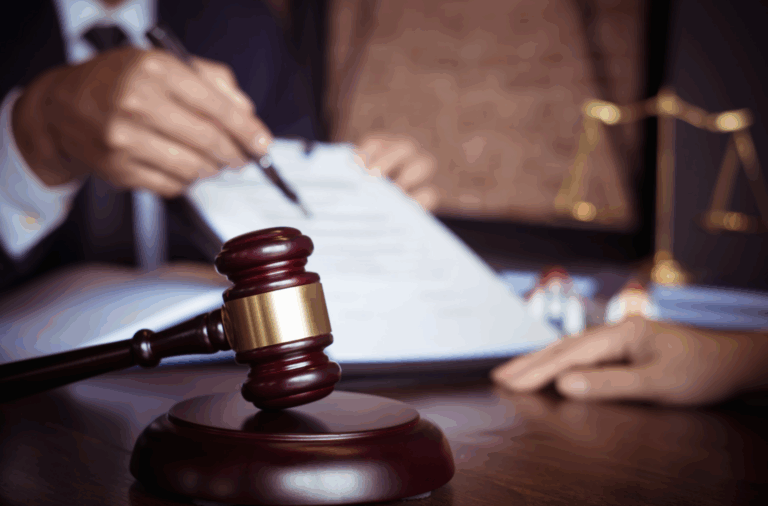Dealing with a large amount of debt can be stressful and confusing. That’s especially true if one or more debts have been sent to collections. Delinquent debts will harm your credit score and cause collectors to call you day and night. But before you can resolve the problem, you need to know how to find out what debt collectors you owe.
If you aren’t sure who to contact about paying your debt, there are several ways to find out. Read on to learn how to find out which collection agency you owe.
How a Debt Ends Up in Collections
If you continue to miss payments on a debt, it becomes delinquent. The creditor will likely make many attempts to collect the debt from you. If it continues to go unpaid, you can go into default. This means you have failed to make your payments as agreed upon in the contract.
At this point, the creditor might decide to send your account to collections. Many creditors have their own internal collections departments. Or they may sell your debt to a third-party debt buyer who will then collect on the delinquent debt themselves or outsource it to a collection agency. Either way, the goal is for the debt collector to recover as much of the debt as possible.
It’s important to note that a debt in collections can hurt your credit score. The collections agency or law firm collecting the debt may also take legal action if the debt remains unpaid. If you are facing a debt in collections, it’s important to understand your rights and options and take steps to resolve the debt as soon as possible.
How to Find Out What Debt Collectors You Owe
Figuring out who you actually owe can be confusing, especially if your debt has been sold off to an agency. So if you need to find out which collection agency you owe, try the following steps.
Check Your Credit Reports
A credit report is a comprehensive record of your credit history. Each credit reporting agency maintains a separate credit report on you. These are used by lenders, landlords, and other organizations to assess your creditworthiness.
A credit report contains information about your past and current credit accounts. This includes credit card debt, student loans, mortgages, medical debt, and more, as well as balances owed, payment history, delinquencies, and bankruptcies.
Your credit report should list any credit accounts you have, including collections accounts and the contact information for collection companies that are handling them. You can get a free credit report from each of the three major credit bureaus (Equifax, Experian, and TransUnion) at annualcreditreport.com.
Checking Your Voicemail and Caller ID
If you’re receiving calls from debt collectors, note the company’s name and the debt details they’re calling about. You should be able to garner the company’s name from the caller ID and possibly more if they leave a voicemail message. Legitimate debt collectors should also provide this information upon request, so don’t be afraid to pick up the phone and ask questions.
Reverse-Lookup the Phone Number
If a debt collector calls you and leaves a message, you can use the phone number to find them. Enter the phone number into a search engine like Google or a reverse-lookup tool to find the name of the creditor. Also, look at comments and reviews from other phone call recipients as to whether the organization is legitimate. Remember, a legitimate debt collector will leave a valid number and details about how to get a hold of them. They won’t, however, leave any details about the debt in a message.
Ask the Original Creditor
Sometimes, the original creditor may still own the debt in question. If that’s the case, they can provide a debt validation letter proving they are the debt’s legal owners. The debt validation letter includes how much you owe and other important details.
However, if it is sold or transferred to a third-party debt buyer, the original creditor may be unable to point you in the right direction. They may not be willing to discuss the debt with you at all. If so, you’ll need other tactics to find the correct debt collection agency.
Wait to Be Contacted
If you know that you have a debt in collections but aren’t sure who you owe, the collections agency will reach out at some point to collect the money. You may receive a letter in the mail, a phone call, or even a message on social media. Keep an eye out for these communications so you can respond appropriately.
How to Tell if a Debt Collector Is Legitimate
There are many debt collection scams out there. Scammers prey on people who are stressed and scared about their debt problems. When a supposed debt collector contacts you, don’t respond until you know they’re legitimate.
- Check for licensing. A legitimate debt collection agency must be licensed in the state where it operates and often by a particular city like New York City or Buffalo. You can check with your state’s licensing authority to verify the legitimacy of the debt collector.
- Verify the debt. A legitimate debt collector will have information about the original creditor and the amount owed. They should also be able to provide documentation to support their claims about the balance they claim you owe them.
- Know your rights. Legitimate debt collectors are prohibited from making false or misleading statements, including threats of arrest or legal action they cannot take. Familiarize yourself with the Fair Debt Collection Practices Act (FDCPA), which outlines your rights as a consumer and the rules that debt collectors must follow.
- Check for complaints. Visit the Better Business Bureau’s website or the Consumer Financial Protection Bureau’s complaint database to see if any complaints have been filed against the debt collector.
If you’re unsure whether a debt collector is legitimate, contact a debt resolution attorney or consumer protection agency for assistance. If you suspect fraud, you can submit a complaint to the Federal Trade Commission (FTC) and Consumer Financial Protection Bureau (CFPB).
How to Negotiate With a Collection Agency
Negotiating with a collection agency should aim to manage or settle your debt in a way that’s financially feasible for you. First, it’s crucial to verify the debt and understand your rights under the Fair Debt Collection Practices Act (FDCPA). Next, assess your financial situation and determine what you can afford to pay, either as a lump sum or in installments.
Initiating contact should preferably be in writing. When negotiating, you might offer a settlement for less than the total debt or propose a payment plan that fits your budget. Ensure any agreement reached is documented in writing, specifying the terms of the settlement or payment plan and confirming that the debt will be considered “paid in full” once you uphold your end of the bargain.
Get Help With Debt in Collections
If you are facing a complex or serious debt collection issue or are unsure of your rights and responsibilities, consulting with a debt help lawyer is a good idea. An experienced debt relief attorney will uphold your rights and help devise a plan to resolve your debt. That may involve negotiating a debt settlement, advising you on bankruptcy law and your legal rights, or other creative debt solutions.
The Tayne Law Group is an experienced and trusted debt help law firm that may be able to help. We’ve assisted thousands of others with debt problems. Find out how by calling today at (866) 890-7337 or fill out our short contact form to get a consultation and learn about your options. All information shared is kept confidential, and the services or calls are never outsourced to call centers. Your matter is important to us, and we pride ourselves on being a trusted resource for those seeking help resolving their debts.
Frequently Asked Questions
Ignoring debt collectors can lead to serious repercussions, including persistent attempts to contact you, a negative impact on your credit score, the accrual of additional interest and fees, and potential legal actions such as lawsuits, wage garnishment, or bank account levies.
There are a few possible reasons why a debt isn’t showing up on your credit report. There’s a chance that your debt simply hasn’t been reported yet. Additionally, not all creditors report to every credit bureau. So, the debt may be reported to one bureau but not to others. There could also be an error or oversight by the creditor or the credit bureau, leading to the debt not being listed. If the debt is very old, it might have been removed from your credit report and past the statute of limitations to collect. Negative information generally stays on your report for up to seven years. Bankruptcies can remain for up to 10 years.
The timeline for when a collection agency reports a debt to the credit bureaus can vary. Typically, it occurs soon after the agency acquires the debt. That said, there isn’t a universal rule that applies to all collection agencies or debts. Practices can differ based on the agency’s policies and their agreement with the original creditor.





